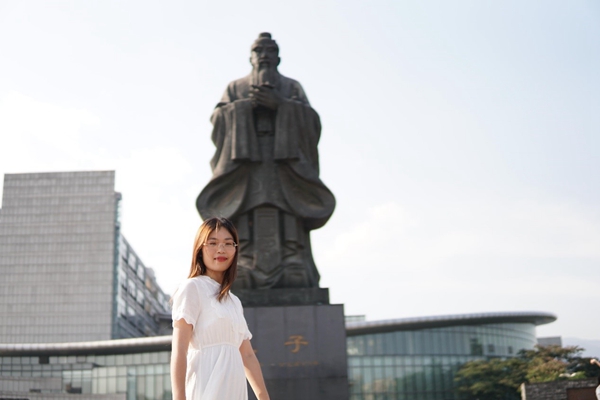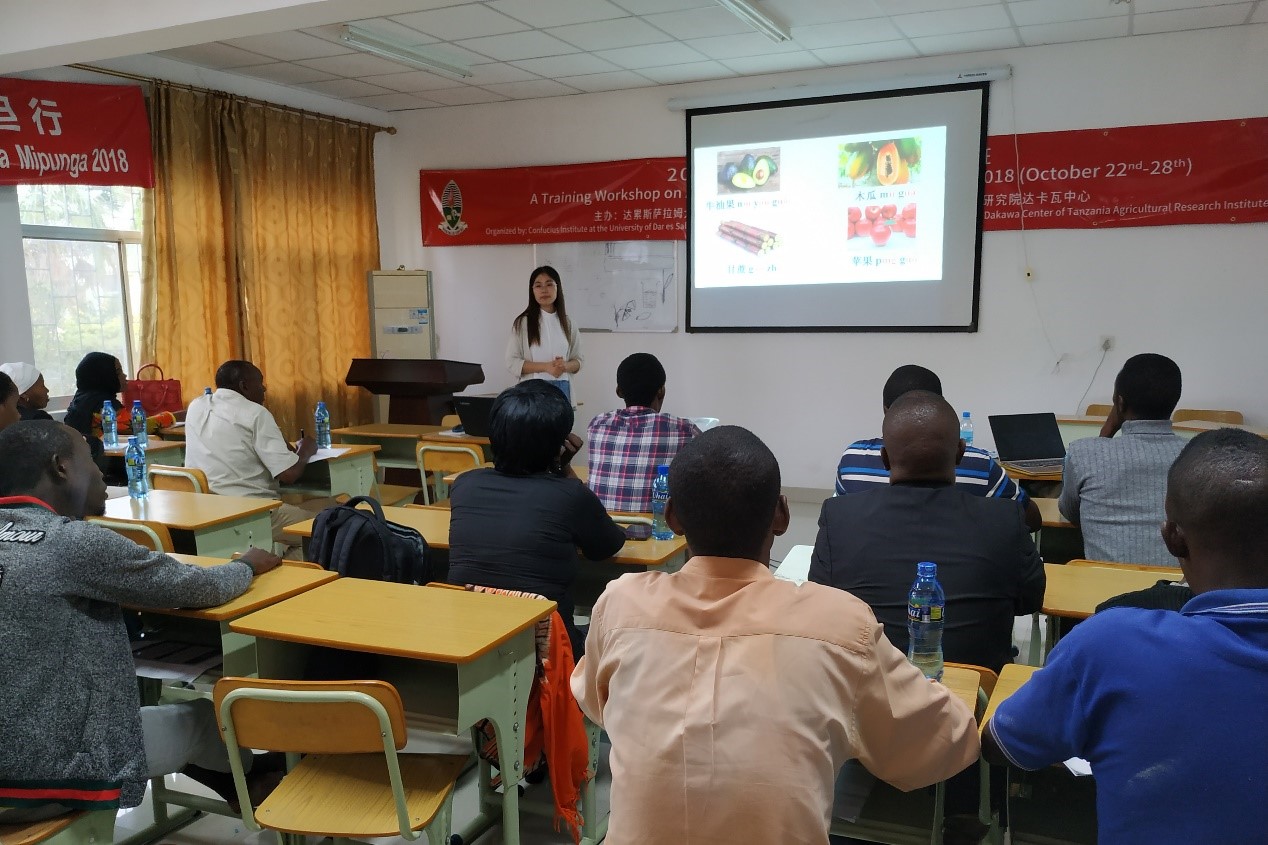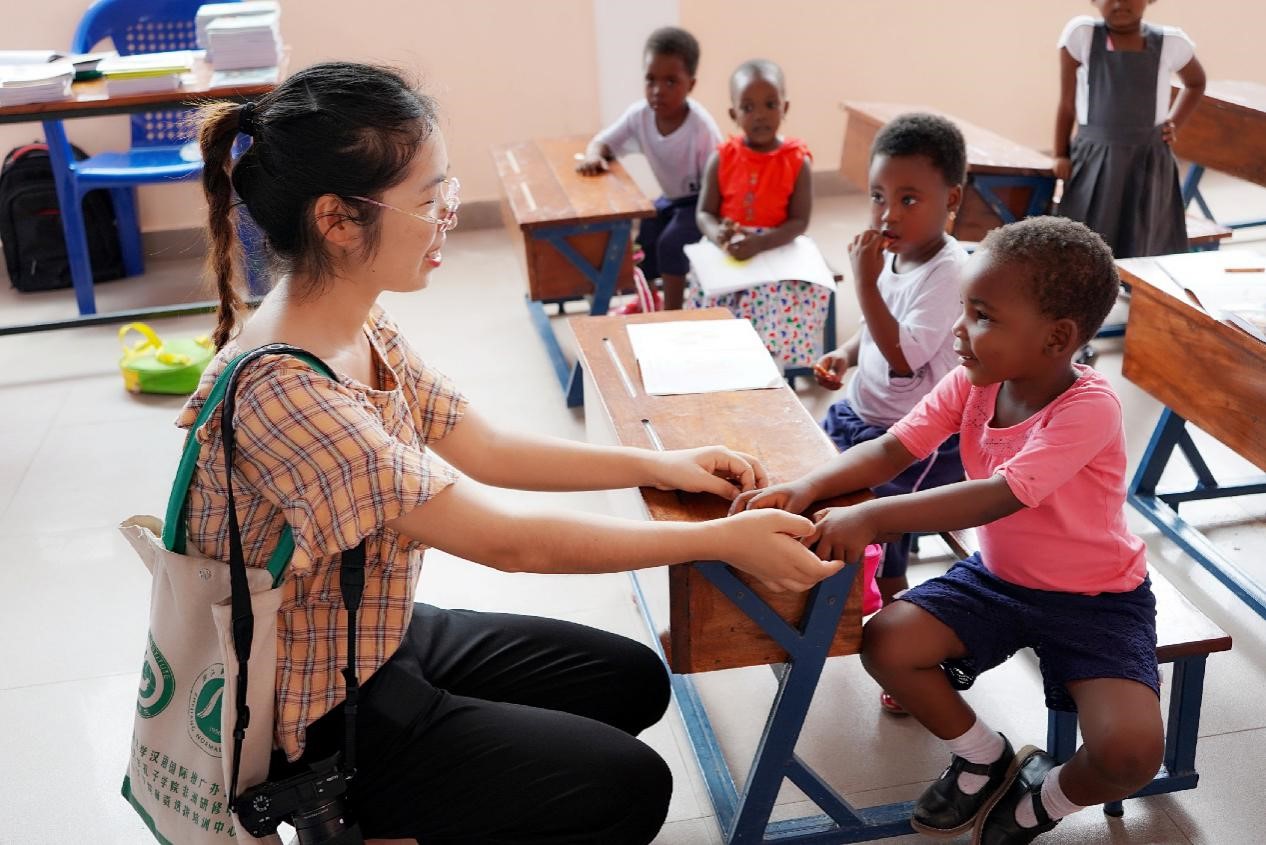Volunteer to teach in Africa: New course for life
- By Gao Zhan
 0 Comment(s)
0 Comment(s) Print
Print E-mail China.org.cn, June 12, 2019
E-mail China.org.cn, June 12, 2019
Volunteering to teach Chinese in Tanzania was Zhang Liping's chance to finally see the world. She never thought it would transform her career so dramatically.

On Jan. 21, 2017, Zhang Liping, as a volunteer Chinese teacher, arrived in Dar es Salaam, former capital city in Tanzania in East Africa. It was Zhang's first trip abroad, and she was a little agitated and somewhat perturbed.
Her arrival was somewhat overwhelming as she was welcomed by a busload of students in the airport.
"I was a little shy in the face of so many students," Zhang recalls. " The students were so enthusiastic and busy carrying my luggage." With singing and laughter all the way, Zhang soon became familiar with these students.
Born in 1992, Zhang is now studying for her PhD at the Institute of African Studies in the Zhejiang Normal University. During her master's degree program, she participated in the national publishing fund project "The Cambridge History of Africa," with cumulative translation and proofreading of more than 700,000 words.
Zhang's master's thesis was also related to African studies. "That's why I decided to go to Africa, thinking it might be easier for me to get a deeper understanding of the translation and the content of the African studies," she recalls.
Zhang has now been to Africa as a volunteer Chinese teacher for two times. Through these experiences, Zhang found what she really loved and wanted to do for the rest of life – namely, to engage in African studies and to be the envoy for Chinese and African education exchanges.
First time to Africa
When Zhang first went to Africa, she was assigned to teach in a rural middle school --Baobab Secondary School.
According to Zhang, this school was short of teaching hardware. Most classrooms had no multimedia equipment; even the chalk needed to be collected in advance and treasured. Printing facilities were limited, and while some teachers could print out texts for their students, most of teachers had to hand-write the contents on the blackboard.
"If the students carefully copy down the content, maybe that would be O.K.," Zhang said with some frustration. "However, many of them didn't know how to copy and write at the beginning."

However, Zhang quickly adapted to the teaching environment. Although she did not understand the local Swahili language at first, she used English to help students understand the Chinese courses.
For those students not so good in English, she patiently added a few more classes to help them, and at the same time she also learned the Swahili language to enhance the quality of her work.
Mi Yunyang, one of the volunteer Chinese teachers who arrived in Africa with Zhang, said: "She is a quick learner. It wasn't long before she began to greet and communicate with local people in simple Swahili."
In August 2017, Zhang tutored two students to participate in the "Chinese Bridge" Chinese Language Competition. Because the schools for boys and girls were divided, she had to tutor the boy first and then go to the girls' school. It was often close to midnight before she returned home.
For the "Chinese Bridge" competition, Zhang chose a popular Chinese song "Friends" for one of the students named Evans. After several adaptations and rehearsals, Evans was able to give a good performance and finally won the best creative award for Tanzania.
After the competition, he was full of excitement and called out to Zhang, "Apple (Zhang's English name), you are the best Laoshi (teacher)."
Influenced by Zhang Liping, Evans went to Jiangsu University of China to continue his study after graduating from high school.

During her first year in Tanzania, Zhang came to understand the status quo of local education, such as lack of teaching materials, small number of available courses, and inefficient class organization.
"After I returned to China, I completed my master's degree. I should have found a job, but I thought I should apply for a Ph.D. because I hoped to continue my research in African studies and work on the development of African education," Zhang said. Finally, she received the doctoral admission letter.
Second time to Africa
In July 2018, Zhang came to Tanzania for the second time and worked in the Confucius Institute at the University of Dar es Salaam. In addition to teaching tasks and organizing activities, she also assumed the task of researching on local primary and secondary education. She paid visits to various schools and families, interviewed government officials, parents, teachers and students, and tried to use scientific educational research methods to analyze the status quo and problems of African education.

At the same time, Zhang took the initiative to undertake the promotion of the Confucius Institute. In just over half a year, she revised more than 220 manuscripts and wrote news items totaling more than 30,000 words, in the hope that more people can see the efforts of the Confucius Institute to promote the Chinese language and culture.
When talking about the daily life in Africa, Zhang said that she had a simple life enabling her to do academic research with peace of mind.
In fact, she has faced many difficulties in working and living in Africa: her residence often suffered from a shortage of water and electricity, and she had to run a few hundred meters to get water. When she went home late, she was afraid that someone would hide in the dark corner and ambush her. In the rainy season, she might easily become infected with dengue fever.
However, Zhang did not regard these as big problems. Her family is not rich, which made her grew up in a self-reliant character from a young age. She said that she had received the help of many people, so she could enter the university smoothly. Therefore, after she went to the university, she started volunteering to help more people.
During her time in university, Zhang led a volunteer team to support education in the poverty-stricken areas during the summer vacation for straight four years.
"She is an independent girl. When she encounters difficulties, she never shrinks, but thinks about how to solve them," said Chen Dandan, a colleague of Zhang in the Confucius Institute at the University of Dar es Salaam.

Zhang said she was deeply touched by the young Africans who wanted to change themselves as well as their country.
"What moved me most was a very low-paid security guard. He comes to the Confucius Institute to learn Chinese every day. After the class, he uses Chinese to send messages to greet me every day. Because he still has to work after class, it is not easy for him to stick to learning Chinese," she said.
Zhang said that the development of African education needed long-term efforts to ensure it was on the right track.
"As a student of African studies, I hope that I can do my best to promote the progress of African education. My path on African studies is just beginning," she added.






Go to Forum >>0 Comment(s)